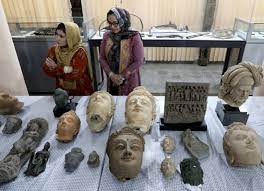The United States has limited the imports of cultural and historical items from Afghanistan, hoping to prevent “terrorists” from profit, the Department of Foreign Affairs said on Tuesday, but experts voiced concerns about unwanted consequences.
The decision, which is applied based on “emergency” and will come into force on Friday, including restrictions for carrying ceramics, paintings, glass, ivory, ancient textiles, tiles and wood pieces, among others, according to the government list.
This import restriction is intended to prevent material traded scientifically enter the US arts market, thereby reducing incentives for the clamping of Afghan cultural heritage and combating profits from the sale of these cultural objects by terrorists and criminal organizations, “said the Department of Foreign Affairs,” said statement.
The State Department said he was taking unilateral action to impose an emergency import restriction because of the “state in Afghanistan”.
US steps following the April 2021 request from the US-supported Afghan government when a collection of 33 artifacts seized from the art dealer based in New York – who authorities say is one of the most productive old-fashioned smugglers in the world – returned to Afghanistan.
Can the Ministry of Finance act based on the ‘demand for the government that is no longer there? “The ancient coin collector and advocate Peter Tompa asked posts on his blog, cultural property observers.
The real question is how this restriction will be enforced and if there are materials that can be confiscated will be repatriated to the Taliban after diplomatic relations [with the US] restored,” he wrote.
The date of the archaeological material is limited from 50,000 BC to 1747, and limited culture includes goods from the ninth century to 1920, the government said.
New regulations can make logistics problems for collectors or curators who already have goods on their way to the US as a auction house preparing to sell pieces during the New York Asian week next month, newspaper art publications show.
For Tompa, one side of the import rules, which will remain valid until April 2026 and can be extended, is that they do not seem to include a ban on modern textiles.
If it happens, such import restrictions will potentially destroy the livelihoods of Afghan women who make live weaving textiles for export,” he wrote.


No Comments Yet